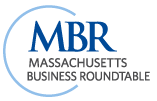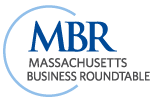Survey of Massachusetts Business Roundtable Members Provides More Insight on Post-Pandemic Planning Among Large Employers
The Massachusetts Business Roundtable (MBR) today released findings following a survey of its members, providing the latest insight on post-pandemic plans among large employers in the Commonwealth.
Most notably, 79% of responding MBR members forecast using a hybrid working model postpandemic; by contrast, 90% of responding members maintained all or mostly in-person operations prior to the COVID-19 pandemic, representing a dramatic change in where and how people will work. Though employers across a range of industries continue to stay nimble as time evolves, 88% of MBR respondents anticipate their organizations will maintain, relocate, or even expand their presence in Massachusetts in the future, primarily due to access to world class talent, while 8% indicated they are considering plans to reduce their Massachusetts presence because of the cost of living or cost of doing business.
“Our members find it extremely valuable to learn what other employers are doing, what employers plan to do, and what employers are still contemplating,” said JD Chesloff, President & CEO of the Massachusetts Business Roundtable. “As the future of work continues to develop, we hope these findings are also useful among other business groups, government, and additional stakeholders since we are all monitoring and assessing the impact of the pandemic today and for the Commonwealth’s future.”
MBR is comprised of 90 large employers, representing more than 250,000 employees statewide. As an employer-driven organization, MBR focuses on public policy solutions to strengthen the state’s economic vitality and competitiveness for businesses to grow and residents to live. Today’s results build on MBR’s priorities as an organization including the work of its Competitiveness Task Force. Findings are based on a combination of surveying 53% of its members and also interviewing CEO’s, Senior Executives, and HR business partners within its membership.
Since the start of the pandemic, MBR has joined other business groups in Massachusetts to survey members, especially to measure how COVID-19 is currently impacting employers. Now focusing within its membership, results reflect business decisions employers have made, will implement, and anticipate making over the next 12 to 24 months.
Key Takeaways from MBR’s Future of Work & Massachusetts Competitiveness Survey:
- Timing: Most employers are awaiting local public health guidance or are unsure when they may return to the office. Among MBR respondents, 35% anticipate returning to the office this calendar year, with an additional 60% either unsure of their timing or as soon as it is safe to do so. Even with these predictions, returning to the office will look different (see next takeaway).
- Hybrid: A significant majority of MBR respondents plan to shift to a hybrid working model post-pandemic. Prior to COVID-19, among respondents, 90% of offices maintained all or mostly in-person operations whereas during the pandemic, 81% of offices have been all or mostly work-from-home. Post-pandemic, the survey found that 79% of offices will shift to a hybrid working model, a dramatic shift in how people will work. What hybrid means remains to be seen.
- Office Real Estate and Design: Employers are rethinking the purpose of in-person work, redesigning the office for increased collaboration when employees are actually in the office. About 38% of MBR respondents said they plan to decrease their Massachusetts footprint (because of the shift to hybrid, not necessarily a decrease in headcount). Additionally, 65% of respondents will be decreasing office density, and 50% said they’d be eliminating personal workstations, as companies consider new office designs and layouts to support in-person collaboration.
- Diversity, Equity & Inclusion: 92% of respondents indicated they would champion measures to advance DEI in their organizations with 88% claiming there will be a visible commitment from executive leadership. As an indication of the level of commitment, 85% of respondents said they intend to increase funding of DEI initiatives from pre-pandemic levels.
- Out-of-State Considerations: 88% of respondents said they plan to maintain, relocate, or expand their presence in Massachusetts in the next 12-24 months, primarily because of access to talent. Those who said they are considering reducing their presence here (8%), would do so primarily because of the cost of living/cost of doing business. Employers are also seeing anticipated trends in out-of-state work post-pandemic but are working through the tax implications. Among MBR respondents, 5% of the workforce from Massachusetts based operations worked out of state pre-pandemic; 21% during pandemic; and 15% anticipated postpandemic.
- Digitization & Automation: Employers have increased adoption of digital tools for employee interaction and customer outreach. Not surprisingly, 90% said they will increase adoption of digitization tools in the next 12 to 24 months. Yet, only 33% anticipated an increase in automation with 58% predicting no change in automation. (It is possible that companies have already put automation tools in place so the degree of increasing automation post-pandemic is not as high).
In the coming weeks, MBR will consider potential recommendations based on trends in data that continue to rise to the top among members and within the Massachusetts business community. MBR also plans to share its findings with interested stakeholders in the business community, government, academia, and beyond. Visit here for a complete overview of the findings.
The content was shared in a press release on May 5, 2021 by the Massachusetts Business Roundtable.
RECENT POSTS
- Quarterly Policy Roundup: Q1 2024
- Black History Month: Reflections from Roundtable Staff
- Roundtable Members Discuss Impact of Business on Society
- Quarterly Policy Roundup: Q3 2023
- What We Heard This Summer in Our Roundtable Member Meetings
- Health Equity in Massachusetts and Why it Matters
- Growing MA’s Labor Market: Why Immigrants Should be Part of the Solution
- Massachusetts’ Future of Energy
- Roundtable Members Share Reflections on Workforce Dynamics
- Quarterly Policy Roundup: Q1 2023

